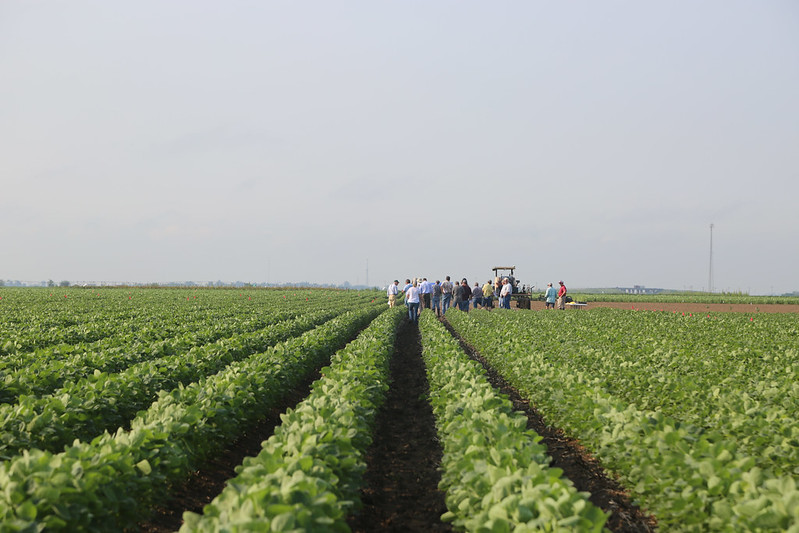“This verdict is just the tip of the iceberg.”
By Andrea Germanos, staff writer for Common Dreams. Published 2-17-2020

Field day participants make their way past dicamba damaged soybeans to hear University of Arkansas System Div of Ag Weed Scientist Jason Norsworthy talk about volatility of dicamba products on Aug 8, 2017. Photo: uacescomm’flickr/CC
German chemicals giant Bayer announced Monday its intention to “swiftly appeal” a U.S. jury’s decision to award a Missouri peach farmer over $265 million in compensation for years of crop losses as a result of drifting dicamba weedkiller.
The legal challenge was the first dicamba suit to go to trial and was brought forth by Bill and Denise Bader, owners of Bader farms. Dicamba is produced by Monsanto, which Bayer acquired in 2018.
Mr. Bader’s suit challenged (pdf) Monsanto’s “willful and negligent release of a defective crop system—namely its genetically modified Roundup Ready 2 Xtend soybeans and Bollgard II Xtend cotton seeds (“Xtend crops”)—without an accompanying, EPA-approved dicamba herbicide.”
“Monsanto sold the seeds before the Environmental Protection Agency (EPA) approved the herbicides for market,” said the complaint.
The Baders, who did not use dicamba, said they lost over 30,000 trees due to Monsanto’s actions, as journlist Carey Gillam wrote earlier this month:
Bader claims Monsanto sold GMO dicamba-tolerant soybean and cotton seeds despite knowing the actions would trigger chemical damage to farm fields that were not planted with the new seeds. The intent, the Bader Farms’ lawsuit alleges, was to induce farmers to buy the specialty seeds as a means to prevent crop damage from herbicide drift coming from neighboring farmers who were planting the GMO crops and spraying them with dicamba.
Testing showed that leaves of his dying peach trees carried traces of dicamba. The 5,000-acre family farm, which produced 5 million to 6 million pounds of peaches annually along with corn, soybeans, various berries, apples, and tomatoes, is now struggling to survive, according to Bader.
The jury sided with Bader Farms on Friday and awarded them $15 million in damages, as St. Louis Public Radio reported:
Monsanto and BASF were found liable for negligent design of the products and negligent failure to warn regarding the products. The jury also found that the two companies created a joint venture to manufacture and sell dicamba-resistant seed and low-volatility herbicides, and that they conspired to create an “ecological disaster” to increase profits.
The jury followed up Saturday with a determination that Monsanto and BASF pay $250 million in punitive damages.
The National Family Farm Coalition wondered if the verdict represented the “start of dicamba demise.”
In a Saturday tweet, the group called the decision a “victory for farmers which courts will hopefully uphold. Bayer bought #Monsanto with knowledge of these issues and should pay for #dicamba damage.”
Pesticide Action Network welcomed the development as well.
“This verdict is just the tip of the iceberg — there is a long queue of farmers who have been impacted by dicamba drift and deserve their day in court,” said Linda Wells, Pesticide Action Network organizing director. “The internal Monsanto (now Bayer) documents uncovered in this case show that the company released a highly destructive and intentionally untested product onto the market, and used its influence to cheat the regulatory system.”
“While farmers who don’t use the Xtend system are hit with crop damage and yield loss from dicamba drift, Bayer and BASF are reaping the financial gains of an increase in acreage planted to dicamba resistant soybeans, and an increase in use of dicamba formulations,” Wells continued. “Bader Farms’ victory in this case signals a turning tide, and opens opportunities for farmers to hold Bayer and BASF legally accountable for the dicamba drift crisis more broadly.”
As Bloomberg noted Monday, Bayer’s legal woes continue “in the face of a hurricane of lawsuits claiming that best-selling weed killer Roundup causes cancer,” over 140 cases related to dicamba, upcoming suits related to safety risks of its Essure birth control device, and challenges over PCB-contaminated waterways.

